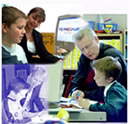READING - A MOST IMPORTANT SKILL PART 2.
CONTINUED - In our world of ‘techno-toys’ many children are not interested in sitting down quietly to read a book purely for enjoyment. This is a shame as reading helps them acquire the vocabulary and a feel for grammar and punctuation which will improve their own writing skills immensely. So how do we, as parents, set the stage to encourage in our children the desire to read?
Firstly we must lead by example and let our children see us reading and enjoying books, magazines and newspapers. There should always be easy access to books both fictional and informative in the home so that children do not feel that books are only for grown-ups. They should see us using books for information, checking the spelling and meaning of words in a dictionary, following instructions in a manual, looking up a timetable for a bus, searching for a number in the Yellow Pages. Talk about doing these things so that they begin to realise how much we depend on reading in our every day lives and how many different forms a book can take, and encourage them to join in so that they can begin to recognise what these different books look like
The earlier we begin to read to our children the better. Even young babies can enjoy looking at books with clear bright pictures of the objects they see around them every day. Name the object and its colour and don’t be worried if your child wants to ‘read’ the book over and over again as young children enjoy things which are familiar and, unfortunately for us parents, this includes books. Stories in simple rhyme are good, and don’t forget the old familiar nursery rhymes which can be learnt and repeated over and over again. Learning rhymes, or anything else by heart, helps to improve your child’s memory skills. Sharing comics about their favourite TV characters encourages pre-school children to want to read and encourages older reluctant readers to have a go at reading for themselves.
Go to your local library to see the selection of books available for each age group. Take your child with you and let them choose but guide them to make sure they pick from the section suitable for their age or reading ability. Very young and pre-school children should be encouraged to pick books with bold clear pictures which illustrate the text. If older children choose a book which they would struggle to read on their own, then be prepared to read it to them but do ensure that the content is suitable. Encourage them to read the ‘blurb’ at the back of the book to see if the book will appeal to them; many children are attracted by the cover of the book rather than the contents.
Make a habit of reading to your child every day and ensure that this is a cosy comfortable time in a quiet room with no distractions. For younger children talk about the illustrations then read the text. Point to the words as you read them so that your child can follow the text if they want. For older children, this is an opportunity to listen to stories which they may not be skilled enough to read themselves. Use this time to sample various types of fiction: some children tend to read a particular type of story, eg adventure, and are reluctant to try something different. It is also an opportunity to read some of the children’s classics such as the Railway Children or Treasure Island; passages from this type of book appear frequently in the comprehension sections of the Transfer Papers. Encourage your child to ask about words they are unsure of as these can detract from their understanding of the passage. Remember that the main reason for reading to your child is for the pleasure they will get from it so try to put as much effort into the actual reading as possible. You may feel silly putting on voices but your child will love it. Read at a speed suitable for the age of your child; young children need you to read more slowly so that they can follow the words, and try to match the tone of your voice to the mood of the text.
Children who are brought up with books which they enjoy will be encouraged to read and finding the right books is often half the battle. Authors come in and out of fashion and older children may want to read only the ‘fashionable’ ones. Librarians in your local library can order the next in the series if it is not available and suggest other authors who write on similar subjects and
County Down
RECENT NEWS POSTS BY KIP MCGRATH EDUCATION CENTRE - BANGOR IN BALLOO
BACK TO SCHOOL
The summer holidays are well advanced and school uniforms are appearing in the shops. The last weeks of the holidays will fly in and September will be here before we know it.BRAIN WORK IN JULY AND AUGUST
The summer holidays will soon be here and much as the prospect of two months off school may be an exciting thought for our children, as parents we need to be aware that during this time it is highly likely that almost total brain shut-down may occur!




